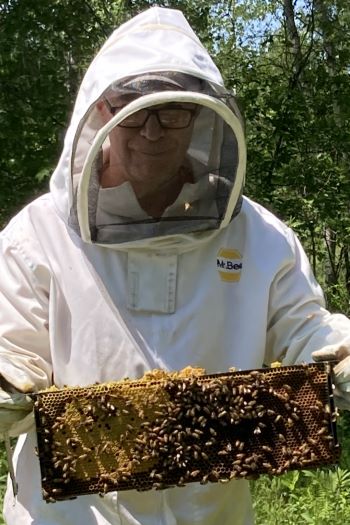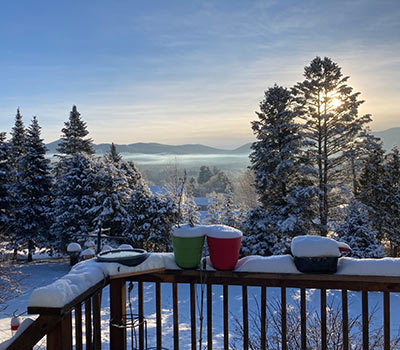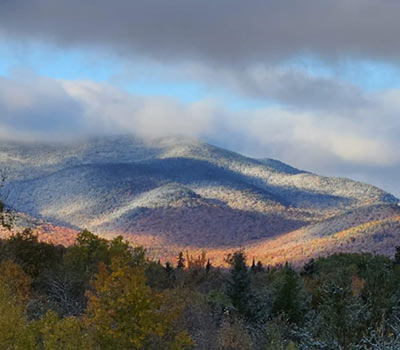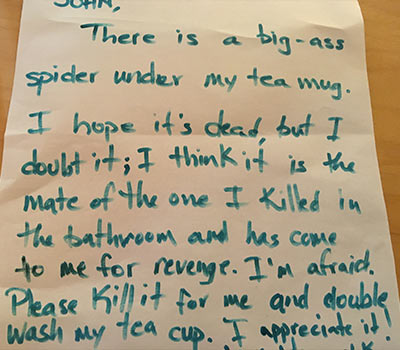
As I believe I may have mentioned in a previous post or two, my wife and I keep bees. I have difficulty, however, calling us beekeepers. “Beekeeper” sounds so all-encompassing. Like a 24/7 kind of thing. Always on alert, always keeping our eyes peeled, ready for anything. Keeping those bees safe from harm, never wavering from the task. Diligence! Like if you were an old-time lighthouse keeper. Blink an eye and you’ve got a pileup on that submerged reef. We are in no way that obsessed. Yeah, we keep bees, but we do other stuff too. My head isn’t constantly immersed in bee-related books, I’m not glued 100% of the time to bee-related blogs. Although I do spend more time doing these things than I ever thought I would. No, I guess I’m a hobbyist with a hobby that can consist of hundreds of thousands of living components. Some of which get angry and express themselves in a painful manner.
During the last few days I have been checking out the hives to see that they’re settling in for the warmer weather, that the queens are reproducing, and that the workers are bringing in nectar to keep everyone fed. Nectar which will eventually end up as honey. They’ll keep some of the honey; I’ll harvest some of the honey. The past month or so, I have missed being able to play around with the hives. This winter was devastating for our little bee operation. We lost all but one of our hives. That’s a lot of bee death. Last summer was very dry and because of this many of the plants the bees usually visit for pollen and nectar were not in their normal full bloom. Or the blooming season was much shorter for them. This resulted in less pollen, less nectar, which resulted in less honey. Less for them, less for us. So I was worried the bees may not have stored enough honey away to make it through the winter. However, the hives where the bees died all had leftover honey, so I don’t think they starved. Maybe the food I provided (mostly granulated sugar) didn’t do the trick. I’m not sure. It’s frustrating.
Another issue to worry about with bees is disease. There are many diseases that, as the world gets smaller and travel gets easier, simply did not exist here decades ago. Diseases from other regions or countries are now present and the bees aren’t equipped to handle them on their own. But we’re pretty diligent about treating for disease and I didn’t see any evidence of this particular issue. So what happened to the hives? It appears that toward the end of the cold weather the queens (one per hive) did not begin reproducing again like they should have. Every year during the cold months the existing bees gradually die off and need to be replaced. This didn’t seem to happen. Why? Damned if I know. It’s one of the frustrating aspects of keeping bees. Sometimes you do everything right and the results don’t add up. It’s maddening. And also expensive if you need to buy new bees. They’re not cheap. We decided to purchase 3 new nucs (nuclei) and queens.
This spring we were hoping to go into the summer with 10 or 15 established hives and I could play around splitting them and grafting queens (I’ll get into this at a later date). However, a lone, tiny hive that’s situated on a friend’s property about 25 miles from here was the sole survivor of the winter. Did the location have to do with its survival? Maybe, but again, who knows? I would have thought this probably would have been the least likely hive to survive going through the winter. It was SO small. I didn’t think there were enough bees to generate the heat necessary to survive a North Country winter. But it did. I checked it out today and it’s thriving. The queen is reproducing, the workers are bringing in pollen and nectar, life looks good.
I will be keeping you apprised of what’s happening with the bees. As I stated earlier, it’s not a vocation, but it IS a hobby that we enjoy. And let’s face it, without the bees we are all screwed. Someone’s got to step up and save the world. And it may as well be me, your savior of the planet.












